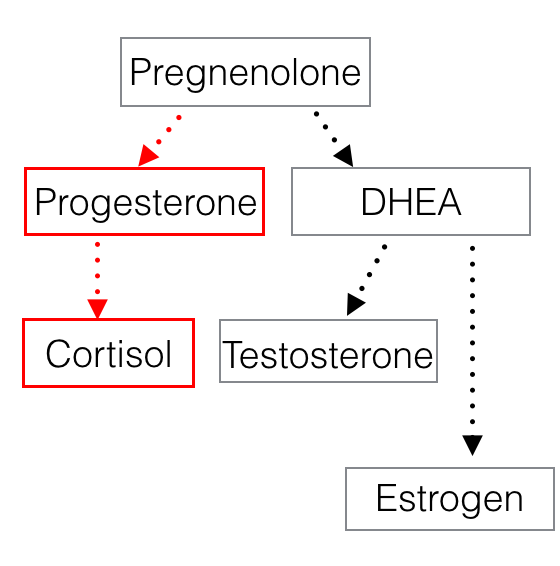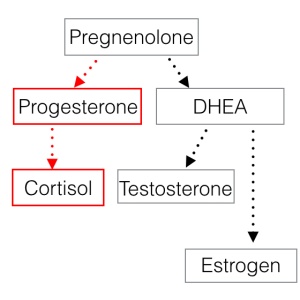Have you ever heard of a guy named Tim Berners-Lee? No? How about Steve Jobs and Mark Zuckerberg? Of course! Well, while Steve Jobs gave us the iPhone and Mark Zuckerberg gave us Facebook, do you know what Tim Berners-Lee gave us? The entire World Wide Web! Yes, that’s right, Tim was the inventor of the web, the thing that makes iPhones and Facebook useful, and yet very few people have ever even heard of him.
Well, when it comes to our hormones, pregnenolone is our hormonal Tim Berners-Lee! It is the foundation of all of our other hormones, it’s the producer of A-list celebrities like estrogen, progesterone and testosterone, none of which would exist without it, and yet most people know next to nothing about this unsung hero! Today we’re going to change that and give pregnenolone the attention it deserves.
Pregnenolone: The Mother of all Hormones
Pregnenolone is what’s referred to as a precursor hormone, as it’s role is to produce all the other hormones we know and love like, estrogen, testosterone, progesterone, aldosterone, and the stress hormones like cortisol. Without pregnenolone, none of these hormones could be made which is why it’s sometimes called the “Mother Hormone”.
So, if we see pregnenolone as the building block for all other hormones, then this is like building your home out of solid gold bricks! The reason for this is because pregnenolone is extremely expensive to produce. The enzyme that converts cholesterol into pregnenolone is limited and requires a significant amount of ATP (cellular energy) to make this conversion, which means our bodies can only produce a limited amount. So how we use our valuable pregnenolone is extremely important.
How does Pregnenolone produce hormones?
While pregnenolone produces a wide array of hormones, it doesn’t itself dictate how much of each hormone gets made. Instead, it balances itself across two pathways that each develop different hormones.
Think of it like a fork in the road where cars can go down one of two paths. On each of these paths there are exits (different hormones), which the cars can take towards their final destination. Pregnenolone only sends the cars down the paths, but it doesn’t care which exit they take. In other words, it doesn’t care which hormones are made.
But it does regulate the flow of traffic at the fork and decides which path the cars should take, which can sometimes lead to one path getting more cars than the other. This is called “pregnenolone steal” and the usual cause of this is something our modern world produces in abundance – stress.
The underlying cause of Pregnenolone Steal: Stress!
When we’re under stress our bodies respond by producing the hormone cortisol. We need pregnenolone to produce cortisol so if we’re chronically stressed, more pregnenolone needs to be diverted to produce more cortisol. To do this it just sends more cars down the cortisol path. Mission accomplished, right?
Not exactly. Every car sent down the cortisol path is a car that’s not sent down the other path. This means that there is less traffic on this second path and less cars taking the exits (making other hormones) on this path. That’s the “pregnenolone steal”. Our stress leads to a demand for cortisol which directs more of our precious pregnenolone towards cortisol production, which in turn steals it from the production lines of other hormones.
If you’re concerned about your stress levels I recommend taking this at home Cortisol Test to measure your adrenal performance and stress. Use code Hormones20 to get 20% off the test.
So which hormones are affected by Pregnenolone Steal?
Estrogen and testosterone are the most common hormones affected by Pregnenolone Steal. See image above.
Signs of low estrogen and testosterone include:
Sporadic periods, amenorrhea, low sex drive, vaginal dryness, painful sex, joint pain, dry skin and eyes, melasma (sun damage) or skin discolorations particularly on the face, lowered energy and motivation, depression and poor memory.
Does pregnenolone effect progesterone levels?
Progesterone is actually on the same pathway as cortisol, which means it is also “stolen” to make more cortisol. Over the long term, you can become progesterone deficient as well. In fact, I think this is the number one cause leading to progesterone deficiency.
Signs of low progesterone include:
Short luteal phase or short menstrual cycles (25 days or less) or more frequent cycles, migraines especially menstrual migraines, breast pain and bloating before your period, heavier flow and irregular cycles.
You can get your estrogen, testosterone and progesterone tested at Lets Get Checked from the comfort of your own home. Be sure to use code Hormones20 at checkout to get 20% off all tests.
If I’m experiencing Pregnenolone Steal, can I just boost my pregnenolone levels?
Here’s the deal – if the restaurant you owned was being robbed, would your first impulse be to make more money to offset the losses? No, you would go after the thief and in the case of pregnenolone, you have to do the same.
When suffering from pregnenolone “theft”, if you simply add more pregnenolone to your system, you will just have more theft. All of that extra pregnenolone will just be sent down the cortisol pathway making things worse, not better. The only way to combat pregnenolone steal is to go after the thief itself; stress.
I know, you’re like, “Come on Nicole! How am I supposed to do that?”
“For fast-acting relief, try slowing down. “ – Lily Tomlin
How do you know if stress is having a negative impact on your hormones? Here are some of the symptoms of pregnenolone steal, which are of course very similar to the symptoms of low estrogen, testosterone and progesterone…
- depression
- fatigue
- anxiety
- hair loss
- facial and body hair growth
- poor memory and brain fog
- low libido
- dry or wrinkly skin
- urinary tract infections
- bloating
- irregular periods
- infertility
When I talk with women about making dietary changes, sometimes I get some mild pushback, but for the most part they are open to making these adjustments. When I talk about chemicals and toxins, they will readily do a good house cleaning and replace the products they’ve been accustomed to with less-toxic options. But when it comes to stress, even my most dedicated clients have a hard time making changes that address this issue.
Chronic stress has become an epidemic, not because it’s a powerful and undefeatable force, but because it’s crept into our culture as something benign and is seen as being normal and inevitable. Often, when I talk with women about ways in which they can get a handle on their stress, I get the sense that I’m asking them to reduce the global levels of greenhouse gases! 🙂
I often hear something like, “Ok Nicole, I’ll do my best!”
Being over-burdened in this way is not normal or inevitable, and in many ways it’s a whole lot easier to address than diet and chemical exposure. Unlike the physical changes we make in our lives, stress is a state of mind. It’s not so much about the things we do in the world, it’s about how we react to the things the world does to us.
How Allostatic Load effects Pregnenolone:
In the medical community, the effects of chronic stress are referred to as Allostatic Load. Allostatic, derived from the Greek words “allo” and “static”, literally means, “remaining stable by being variable.”
This is the state of our bodies between times of homeostasis, or the transitory state between times of structure and stability. For some people, allostatic periods are short, with their body’s stress responses diminishing once the stressful situation has passed, allowing them to settle back into a homeostatic state.
But for other people, either through constant and repetitive stressful situations in their lives, or due to dysfunctions in their body’s management of stress, can find themselves in a chronic allostatic state.
Basically, stuck in “on mode” without ever being able to find any peace and security. This allostatic state is what leads to pregnenolone steal and all the complications that come with it.
In order to bring your body out of this cycle and restore it to a state of homeostasis, the first thing that you need to do is identify the underlying triggers of your stress. Relationships, jobs, financial worries, and past traumatic experiences can all be triggers for your stress responses.
Sometimes you can make changes to your life to mitigate your exposure to these situations but for many of us, this is “just life.” But just because the circumstances are fixed does not mean the ways we react and respond to them are unchangeable. Remember, stress is not an external force that is affecting us, it’s an internal reaction to external events. We control our stress, not the other way around.
Here are a couple of supplements I recommend that can help mitigate the adverse effects of stress:
Phosphatidylserine
Yeah, how the heck do you even pronounce that one right? Good thing you don’t have to be a good speller to reap the benefits of this phospholipid. There is now quite a bit of evidence showing that phosphatidylserine significantly dampens the effect of external stress on the HPA axis (hypothalamic pituitary adrenal axis – which determines how you handle stress), and helps you manage stress-related disorders. I recommend about 400-800mg a day of PS but start at 400mg and work your way up if you don’t see improvement in 2 weeks. I recommend these brands:
Now Foods Phosphatidylserine
Integrative Therapeutics Phosphatidylserine
Rhodiola
Rhodiola is a plant that grows primarily in Asia and Eastern Europe. It has been used for fatigue, memory loss and to increase productivity and mitigate the general effects of stress for centuries. What’s even cooler is that rhodiola has been shown to be effective for adrenal fatigue, lack of ovulation and irregular/infrequent periods! I recommend 200mg 1-2 times a day. This is the brand I recommend:
Get my free Stress Less Tool Kit!
To help women take back control of their emotional responses to stressful situations, I have developed a protocol that addresses the physical and psychological impacts of chronic stress and provides a clear guide towards living a “stress-less” life.
Chronic stress is not normal and if left unresolved can be extremely damaging to your health and disruptive to your hormones. Trust me on this – it’s the lesson I’ve learned over and over!
If you feel like runaway stress is having a negative impact on your physical and emotional health, then grab my Stress Less Tool Kit so you can begin to redefine the relationship you have with stress, and take back control of your life.
xoxo,





8 thoughts on “Pregnenolone Steal: The Great Hormonal Heist”
Some of this goes against what I learned in my textbook The Role of Stress and HPA Axis in Chronic Disease, I think because in your example the pathways are oversimplified so it’s a bit of a misnomer.
I tried low dose of pregnenolone and at first it was fantastic and then I had to stop taking it and couldn’t figure out how to keep using it without side effects. Even though I was only on it at a low dose for a few months, it was reallly difficult coming off. I tried to come off very gradually but still had a terrible kick-back. Depression, very low blood pressure-it was one of the worst experiences of my life health-wise. After coming off I began to experience weight gain and hair loss. As an older woman, 62 at the time it was horrifying, truly. I have now -2 1/2 years later gained 20 pounds and lost 2/3’s of my hair. I have never been able to stop this. I am very well educated on health, hormones and diet. I don’t find a solution anywhere. Could you help me? I have been blood tested and nothing shows up except generally low female hormones. But I do use bio identical hormone creams, just haven’t been able to increase to a full dose because I don’t process them well and I start hot flashing and turn on eczema when I go to a full half dose, even. Begging for help- I will have to start wearing a wig soon and now at 5’9” I weight 185. Help me please
Thank you for making this so easy to understand. I’ve been thinking about supplementing with pregnenolone, too. I definitely am an anxious person with a lot of wrong thinking, but when I was deep in peri menapause my anxiety and depression became very cyclical and irrational and unbearable. I was becoming dysfunctional. After years of consideration I started a very low dose of BHRT Progesterone as opposed to an anti depressant. And it helped me considerably with the emotional issues and several physical issues, ie. spotting, psoriasis, pms, painful breasts, thin skin. I feel like it helped my adrenal system reboot. I was finally getting sleep. After about a year, I felt like the progesterone was not needed. It was actually making me feel over drugged, so I stopped taking it last month and that has been o.k., however, the spotting Is back, my psorasis is flaring a bit, my eyes are feeling dried out. In my research I came across pregnenolone and it seems to make sense that I would supplement with it rather than progesterone. I’m still on the fence.
Great post. So interested in this! Could you please provide references to your sources?
*allostatic
my automatic spell check got too active 🙂
Great article Nicole!
I am going through university studies on Allopathic Load/ Pregnelone Steal, and, I must say, you describe the whole thing in such an easy to understand way!
Thanks a lot,
Madina
Thanks!
I’ve been reading up on the pregnenolone steal. But so far the articles have only covered the way the hormones work. “Cortisol needs more, steals from the rest” basically. And the basic symptoms that arise.
But your article was so much clearer about how and why it all happens. And is the first to put it all in perspective to life!
From what I’d read I was about to supplement with pregnenolone, give the “Mother Hormone” more to work with. Your reasoning for not doing so, and the negative result that wouid come from it makes perfect sense! Thank you!
The answer being less stress makes perfect sense also. But it’s unfortunate that it won’t be as easy as taking a supplement.
Would taking a small amount of DHEA or testosterone be helpful while making the stress related changes? Having more energy and not being so ‘down’ seem like they’d help me along the road to less stress. And they can’t contribute to more cortisol.
If they could be helpful, what dosage would you suggest?
Thanks again for your insight.
Guessed it! 🙂